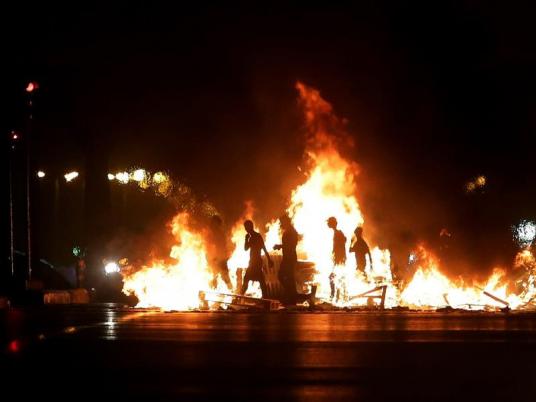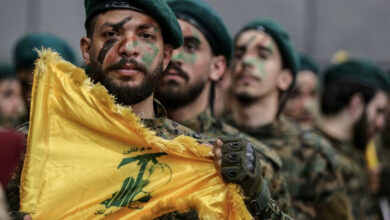
It was 2 am on Monday morning when the shooting stopped in Beirut’s Sunni neighborhoods. Scores of masked gunmen on mopeds rushed back to their hideouts, leaving the streets to the heavily deployed Lebanese army. It was the latest episode of unrest that swept Lebanon after a car bomb assassinated Brigadier General Wissam al-Hassan, the head of the Intelligence Branch of the Internal Security Forces.
The bomb went off two blocks away from a central square in Beirut’s Christian neighborhood of Ashrafieh on 19 October.
“We know it was Syria,” says Maroun Khoury, 78, a resident of a building damaged in the explosion, minutes after the blast. “This was a message that they want to destabilize Lebanon, to create strife among the Lebanese. Nobody has any doubt about it,” he adds while stepping through the broken glass of his building.
The presumption that it was a plot made in Damascus became largely accepted after the identities of the victims were made public four hours after the attack. Hassan, a 43-year-old Sunni from North Lebanon, was heading the only Lebanese security agency widely perceived to oppose Syrian interests. The other three — State Security, the Directorate of the General Security and Military Intelligence — are all deemed close to the Syrian regime in Damascus and its Lebanese allies.
Hassan’s assassination immediately brought angry Sunnis to the streets and threatened Lebanon’s already volatile security. The intelligence chief was a key security figure, perceived as anti-Syrian and very close to former Lebanese Prime Minister Saad Hariri. Under his command, the ISF Intelligence Branch exposed and dismantled Israeli spy networks and played a key role in the Special Tribunal for Lebanon, which is investigating the assassination of former Prime Minister Rafiq Hariri. On 14 February 2005, Hariri was killed by a car bomb in central Beirut.
Hassan’s latest achievement was in August, when he oversaw the dismantling of an alleged Syrian-backed terror cell planning plots in North Lebanon. Former Information Minister Michel Samaha, a close friend of Syrian President Bashar al-Assad, was arrested on Hassan’s orders in connection with the plot.
According to Lebanese security sources, Hassan had been receiving death threats since Samaha’s arrest and spent two months in Paris together with his family for security reasons. He had arrived at Beirut’s international airport, named for the late Hariri, hours before the bombing.
It was the 15th attack on a Lebanese state dignitary since Hariri’s death. His killing, attributed to the Syrian government, triggered mass protests on 14 March 2005 and led to the end of a three-decade Syrian occupation of Lebanon and the split of Lebanese parties into two political alliances.
The anti-Syrian alliance, called March 14, gathered together Hariri’s Sunni Future Movement, the Christian Lebanese Forces and Phalange Party, as well as the Druze Progressive Socialist Party. The pro-Syrian alliance, known as March 8, made up of the Shia Hezbollah and Amal Movement, the secular Syrian Social Nationalist Party and Christian Free Patriotic Movement, took to the streets on 8 March to support Syria’s presence in Lebanon. Assassinations and bomb attacks continued in Lebanon, targeting mostly March 14 politicians and security figures aligned with the anti-Syrian coalition. The last who was assassinated before Hassan was one of his subordinates. ISF Captain Wissam Eid, a Sunni who was targeted by a car bomb in January 2008 after he had handed in a telecommunication report highlighting the involvement of Hezbollah operatives in Rafiq Hariri’s murder.
The March 14 politicians blamed Damascus for the assassination and asked for the resignation of the pro-Syrian government, while pro-Syrian leaders insisted that Al-Qaeda was involved.
However, Hassan’s assassination, that of another high-ranking Sunni official, inflamed the streets in Sunni neighborhoods of Beirut, Tripoli and in the northern region of Akkar, mainly inhabited by Sunnis. The mobs burned tires and blocked roads, while armed Sunnis in Tripoli battled with pro-Syrian Alawi gunmen. The armed clashes spread to Beirut after Hassan’s funeral on Sunday evening.
After the funeral, a peaceful protest called on by anti-Syrian politicians of the March 14 coalition asking for the resignation of the March 8 government led by Sunni Prime Minister Najib Mikati turned to violence. Scores of protesters stormed the Prime Minister’s office in central Beirut asking for him to step down.
The gunfire soon started in the neighborhoods inhabited by Sunnis. Six people were wounded in the exchanges of machine-gun fire and rocket-propelled grenades between the predominantly Sunni Tariq al-Jdideh area and nearby Barbour, a neighborhood controlled by the Shia Amal Movement and Hezbollah.
“This is a plan to defend Tariq al-Jdideh from Hezbollah and all Syrian proxies. It’s a plan to make this neighborhood into a Sunni fortress just like the Shias have their Hezbollah fortress,” a resident of the neighborhood says. “I am not scared at all. The boys in the neighborhood were around last night protecting the building. We’re safe. We keep our lights off during the fighting. This is not going to end soon,” he explains while waiting for the army to finish its raids in the area.
Imad Salamey, a professor of political science and international affairs at the Lebanese American University, has no doubt that the assassination was the act of the “desperate Syrian regime,” meant not only to kill Hassan but to also create strife in Lebanon.
Yet, unlike in 2005, when mass demonstrations followed the assassination of Prime Minister Hariri, there has been no sign of such popular street politics.
“It is clear that the Lebanese people have given up on peaceful protests because they lost their faith that they can change anything at the political level,” Salamey says. “On the other hand, the Sunnis [who have mounted armed attacks on Hezbollah and March 8] feel that extreme violence is the only way. In order to confront Syria and its ally, Hezbollah, they feel they have to use the same means as the enemy,” he says.
The resultant shoot-outs don’t approach the scale of violence that would bring the country to the brink of civil war once more, but are enough to bring old tensions to the surface again.
Prime Minister Mikati has become the target of the protests because the Sunnis perceive him as a traitor, portraying him as Hezbollah’s prime minister. “They feel that the prime minister, who is also a Sunni, is not really representing them. Sunni figures are being assassinated under the rule of a government led by Hezbollah. Mikati is Sunni, but the Sunnis perceive him as a cover up for the Iranian and Syrian backed government,” Salamey points out.
Meanwhile, in Ashrafieh, the bomb left hundreds without shelter, sitting around damaged buildings waiting for security forces to let them collect their belongings. They say they don’t feel like protesting against the government and they want the fighting to end.
“They are destroying this country,” says a man in his 70s with a wound on his cheek. “We’ve been living like this since 1975. We are not going to change anything this way. It what the Syrians want, they want us to fight each other,” he adds.
Another woman, sitting on the stairs of a damaged building sighs: “Haram, our Lebanon! It’s such a pity. It was so beautiful in the 60s. When is this chaos going to end?”
This piece was originally published in Egypt Independent's weekly print edition.




